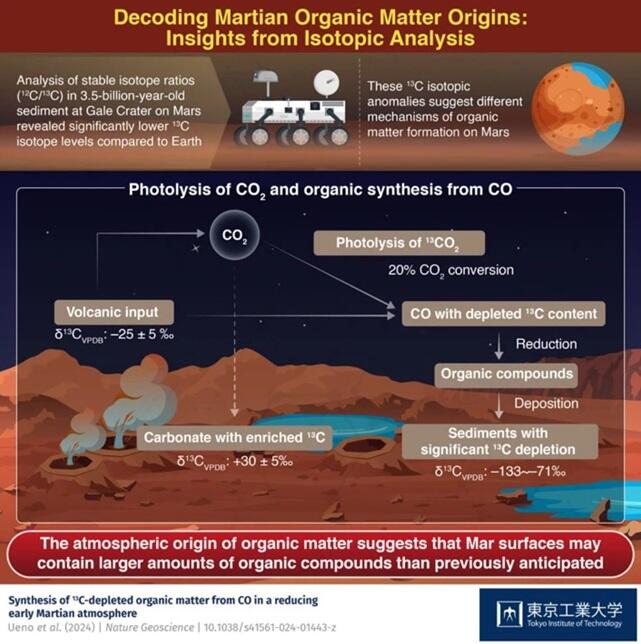A research group led by Professor Yuichiro Ueno of the Department of Earth and Planetary Sciences, Division of Science and Engineering at Tokyo Institute of Technology, Professor Matthew Johnson of the University of Copenhagen in Denmark, and Lecturer Shohei Aoki of the Graduate School of Frontier Sciences at the University of Tokyo announced that it has discovered that organic matter contained in Martian sediments is derived from carbon monoxide (CO) in the atmosphere. Experiments and theoretical calculations showed that the decomposition of CO2 in the atmosphere by sunlight produces CO with a different stable isotope ratio on Mars than on Earth. It was also found that the produced CO became organic matter and was deposited during the early development stage of Mars. These findings are expected to bring new perspectives to future Mars exploration activities and were published in the May 9 issue of the international academic journal Nature Geoscience.

Recent exploration on Mars has revealed that in its early history, more than 3 billion years ago, it had lakes and oceans with liquid water, which is very different from today. Analysis of Martian sediments also revealed that early Mars contained organic matter. However, the origin of this organic matter, how it was formed, and whether it was brought to Mars by meteorites was unknown. Until now, NASA's Mars rover Curiosity has precisely measured the stable isotope ratio (13C/12C) of carbon for organic matter found in the sediments. The results showed that the ratio of 13C in the organic matter on Mars, was extremely low (0.92%−0.99%) compared to that observed on Earth (about 1.04%). These levels of 13C have not been detected in any other parts of the solar system.
In this study, the researchers examined the possibility that this difference in 13C abundance may be due to differences in the process of organic-matter formation. The earth's organic matter is produced by photosynthesis and is dependent on the fact that 12C is slightly more easily fixed during the process. Various processes of generating 13C were examined to determine which processes result in lower 13C generation. The results showed that the reaction in which CO2 is decomposed by sunlight (photodissociation) produces CO with extremely low 13C ratios. In the same reaction, CO2 is decomposed by sunlight into CO and O and 12C is more easily decomposed, as confirmed by theory and experiments.
Last year, Ueno, together with Aoki and their group, used observation data from the European Mars Reconnaissance Orbiter to show that CO in the Martian atmosphere is poor in 13C. Photodissociation reactions occur on Earth and Mars, but CO is quickly oxidized back to CO2 in their current environments. Early Earth and Mars are thought to have had reductive environments, with no strong oxides on the surface. Previously, Ueno confirmed through experiments that in the reducing atmosphere of the early development stage that is rich in hydrogen and other gases, CO does not revert to CO2 but reacts further with the atmospheric gases to produce organic matter such as formaldehyde (HCHO), organic acids, and amino acids. Furthermore, analysis of the early Martian carbon cycle based on the results of this study revealed that up to 20% of atmospheric CO2 was converted into organic matter on early Mars. This organic matter was deposited on the Martian surface. This also indicates that there may be larger amounts of organic matter buried in the sediments than what is currently estimated. The results of this study do not rule out the possibility that biogenic organic matter is contained in Martian sediments.
Ueno said, "NASA is planning a mission to bring back samples from Mars in the future. We believe that the results of this study have provided important insights into the direction of future exploration. I myself have studied not only Mars but also the history of Earth, and it is highly likely that the early Earth environment differed from the present environment in that organic matter was created from CO, as is the case on Mars. It is quite possible that the reason why life on earth began may have been due to the production of organic matter from CO, and we are expanding our research in this direction as well."
Journal Information
Publication: Nature Geoscience
Title: Synthesis of 13C-depleted organic matter from CO in a reducing early Martian atmosphere
DOI: 10.1038/s41561-024-01443-z
This article has been translated by JST with permission from The Science News Ltd. (https://sci-news.co.jp/). Unauthorized reproduction of the article and photographs is prohibited.




